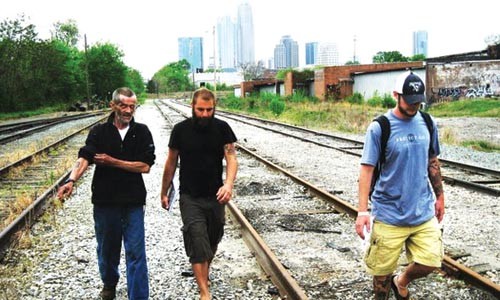They left the film equipment locked in the car, figuring it was safer than keeping it with them on Miami's streets, where they had been living.
The group of Pittsburgh-area residents, Galen Sisco, Kevin Saftner and Drew A. Dayton, had just scrounged enough money to go into a restaurant. When they came back out, $5,000 worth of mostly borrowed video and computer equipment was gone -- someone had broken into their car.
"I just told them, 'Welcome to Miami,'" recalls Marilyn Brummitt, director of community development at the Miami Rescue Mission, which helps the homeless. "Things can happen when you're out there."
The trio learned that for themselves as they spent March and April living on the streets. They were seeking to learn about a problem they say is "swept under the rug" for a documentary called Needed Change. The film blends their observations and experiences with interviews from the homeless and those who try to help them.
Saftner says he had always been interested in the plight of the homeless. His idea developed post-college when Sisco, 24, of Fayette County, got laid off, and Saftner, 24, of Dormont, had financial difficulties after trying to open a restaurant. (Sisco's roommate Dayton spent just under a month with them, returning to graduate college.)
"If someone else was in our position and didn't have good friends and family behind them, they'd be screwed," Saftner says.
That proved true more than once. After being robbed of their handheld camcorder, microphones and laptops (and once of Saftner's shoes), they used a tiny emergency fund to buy a handheld Flip camera. Meanwhile, friends and supporters reading their blog (www.neededchangedocumentary.blogspot.com) and Facebook page scraped up money and equipment so they could continue filming.
The Needed Change crew documented where they slept -- beneath bridges and lifeguard towers, for example -- and captured slice-of-life scenes from the street: a guy in a business suit bumming a cigarette from a homeless man, another apparently injecting drugs on a sidewalk. Most of the homeless they met were eager to share their stories and often directed them to shelters and places to eat.
"We just walked into this stuff," Sisco says. "It wrote itself."
They'd travel by foot, storing equipment in the car until it was broken into twice. Then they kept what little they had left on their person. Public libraries offered places to blog. To compile the film, the filmmakers downloaded footage and photos onto a portable drive and sent it to a friend for editing.
The three spent most of their time in Miami, though Sisco and Saftner also visited New York City, New Orleans and Charlotte -- cities chosen because of the size of their homeless populations, and because relatives were close by, just in case.
They've since paired up with Rescue Earth, a nonprofit for social and environmental awareness. Rescue Earth is helping with the film's publicity, while the Needed Change crew helps the organization with video projects. They also worked with the Miami Rescue Mission. With MRM serving 1,000 homeless per day, community-development director Brummitt hopes the documentary shows that the homeless are "not always ... lazy bums who won't go out there to work."
Saftner and Sisco agree, saying many they met simply fell on hard times caused by lay-offs, domestic-violence issues or mental-health struggles. And many, they were surprised to discover, were families. Some were even homeless by choice. It's still a critical issue: Estimates vary, but the National Law Center on Homelessness and Poverty reports that 3 million people a year experience homelessness in the United States.
They also made friends along the way, such as Raivis Gerix, a 22-year-old Latvian who came to the U.S. "to explore." He joined the project and returned to Pittsburgh with them in late April.
Their project wasn't without criticism: Comments on a Miami blog contend they should call the project "how to have a free vacation."
But the documentary has the support of those they met. A woman in New Orleans credited the filmmakers for helping her, and Brummitt says "they're the real deal."
Saftner and Sisco hope to release the documentary in the fall, and take the criticisms in stride.
"If it was a vacation," Sisco says. "It was the shittiest vacation you've ever been on."















